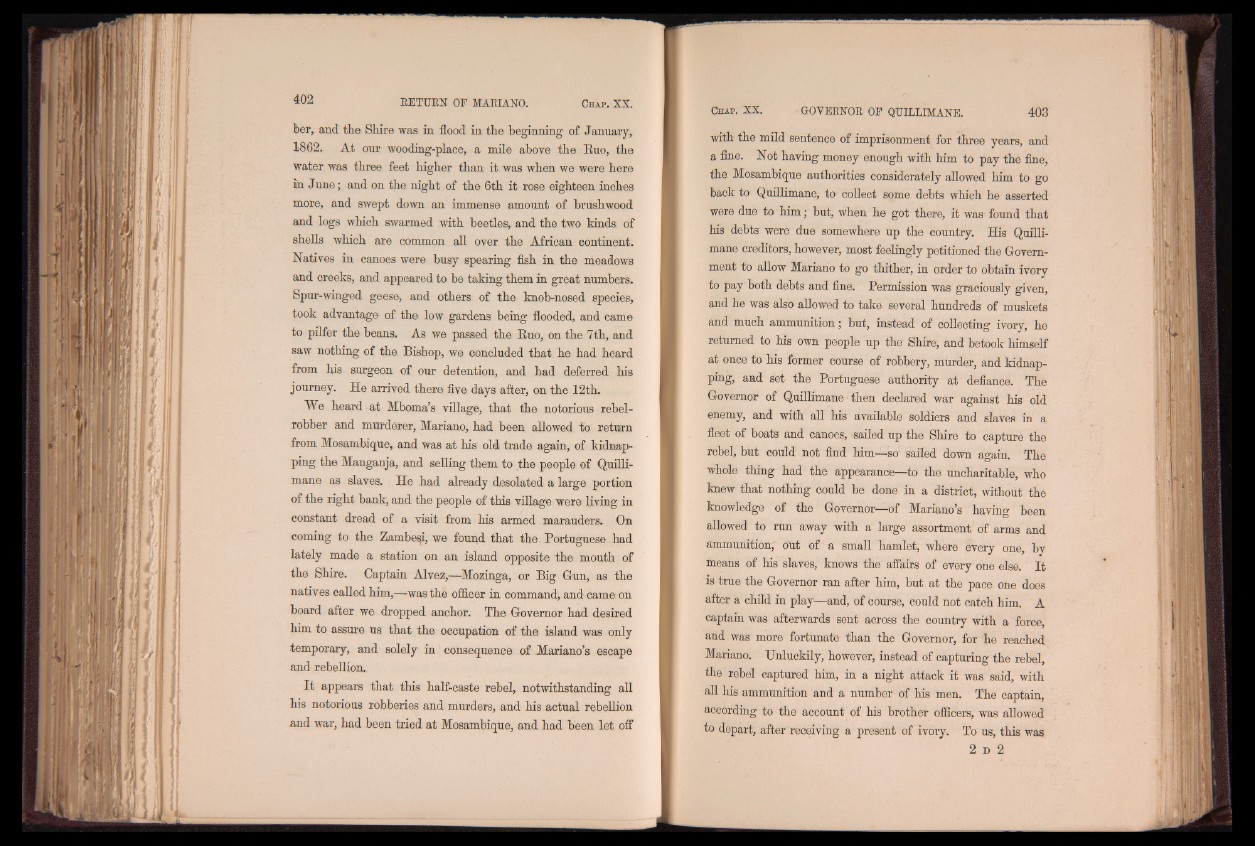
her, and the Shire was in flood in the beginning of January,
1862. At our wooding-place, a mile above the Buo, the
water was three feet higher than it was when we were here
in June; and on the night of the 6th it rose eighteen inches
more, and swept down an immense amount of brushwood
and logs which swarmed with beetles, and the two kinds of
shells which are common all over the African continent.
Natives in canoes were busy spearing fish in the meadows
and creeks, and appeared to be taking them in great numbers.
Spur-winged geese, and others of the knob-nosed species,
took advantage of the low gardens being flooded, and came
to pilfer the beans. As we passed the Euo, on the 7th, and
saw nothing of the Bishop, we concluded that he had heard
from his surgeon of our detention, and had deferred his
journey. He arrived there five days after, on the 12th.
We heard at Mboma’s village, that the notorious rebel-
robber and murderer, Mariano, had been allowed to return
from Mosambique, and was at his old trade again, of kidnapping
the Manganja, and selling them to the people of Quilli-
mane as slaves. He had already desolated a large portion
of the right bank, and the people of this village were living in
constant dread of a visit from his armed marauders. On
coming to the Zambezi, we found that the Portuguese had
lately made a station on an island opposite the mouth of
the Shire. Captain Alvez,—Mozinga, or Big Gun, as the
natives called him,—was the officer in command, and came on
board after we dropped anchor. The Governor had desired
him to assure us that the occupation of the island was only
temporary, and solely in consequence of Mariano’s escape
and rebellion.
I t appears that this half-caste rebel, notwithstanding all
his notorious robberies and murders, and his actual rebellion
and war, had been tried at Mosambique, and had been let off
with the mild sentence of imprisonment for three years, and
a fine. Not having money enough with him to pay the fine,
the Mosambique authorities considerately allowed him to go
back to Quillimane, to collect some debts which he asserted
were due to him; but, when he got there, it was found that
his debts were due somewhere up the country. His Quillimane
creditors, however, most feelingly petitioned the Government
to allow Mariano to go thither, in order to obtain ivory
to pay both debts and fine. Permission was graciously given,
and he was also allowed to take several hundreds of muskets
and much ammunition; but, instead of collecting ivory, he
returned to his own people up the Shire, and betook himself
at once to his former course of robbery, murder, and kidnapping,
and set the Portuguese authority at defiance. The
Governor of Quillimane • then declared war against his old
enemy, and with all his available soldiers and slaves in a
fleet of boats and canoes, sailed up the Shire to capture the
rebel, but could not find him—so sailed down again. The
whole thing had the appearance—to the uncharitable, who
knew that nothing could be done in a district, without the
knowledge of the Governor—of Mariano’s having been
allowed to run away with a large assortment of arms and
ammunition, out of a small hamlet, where every one, by
means of his slaves, knows the affairs of every one else. It
is true the Governor ran after him, but at the pace one does
after a child in play—and, of course, could not catch him. A
captain was afterwards sent across the country with a force,
and was more fortunate than the Governor, for he reached
Mariano. Unluckily, however, instead of capturing the rebel,
the rebel captured him, in a night attack it was said, with
all his ammunition and a number of his men. The captain,
according to the account of his brother officers, was allowed
to depart, after receiving a present of ivory. To us, this was
2 d 2